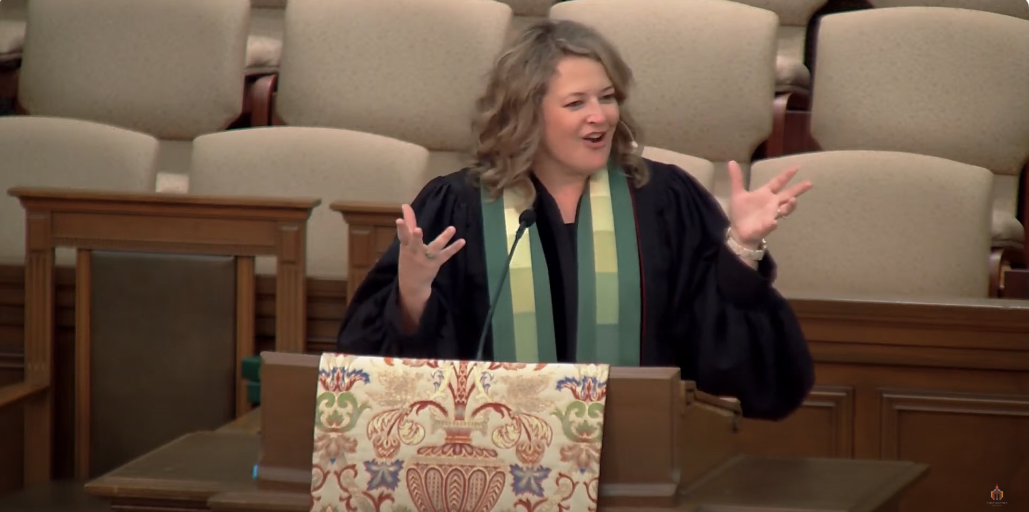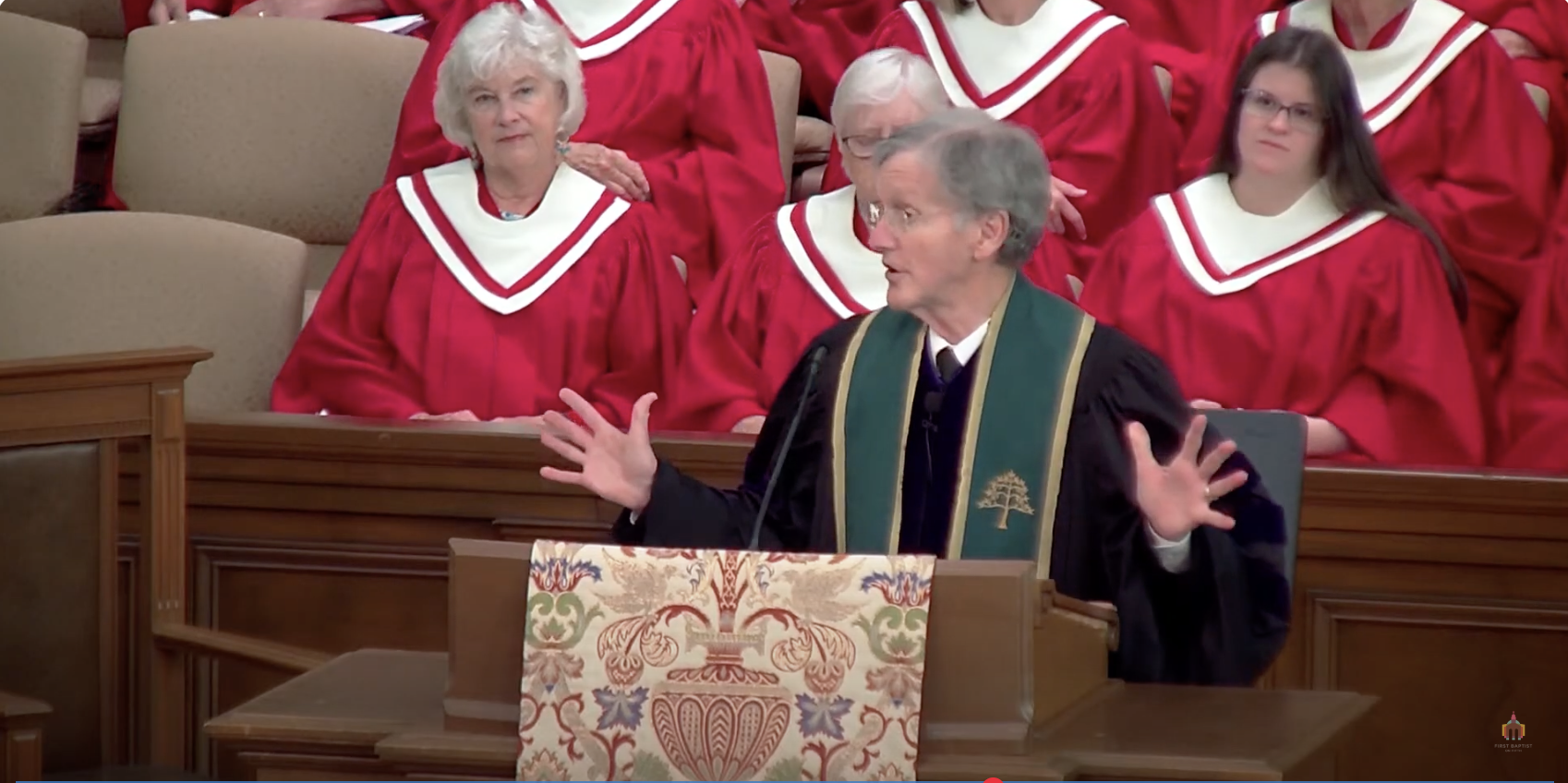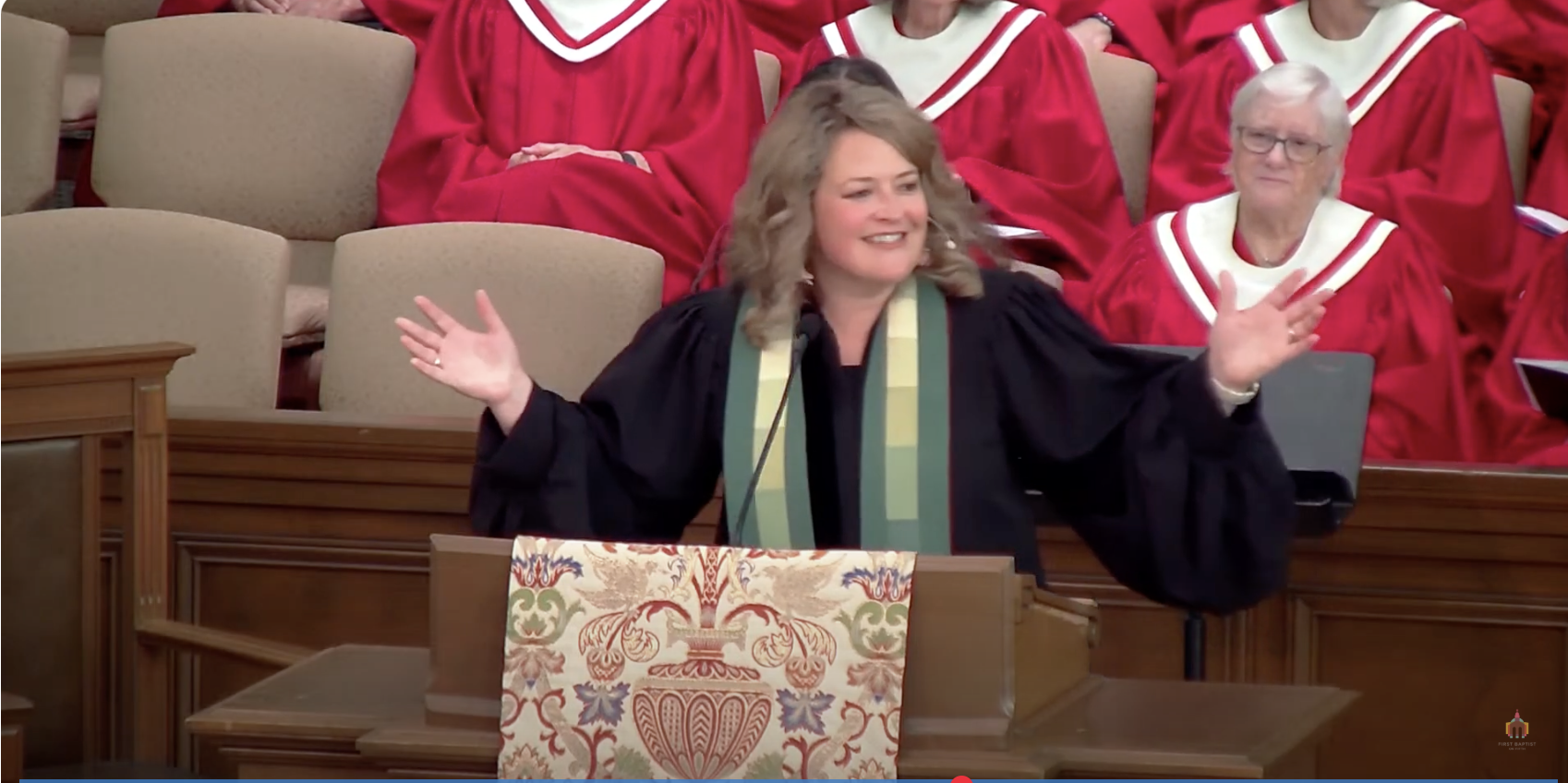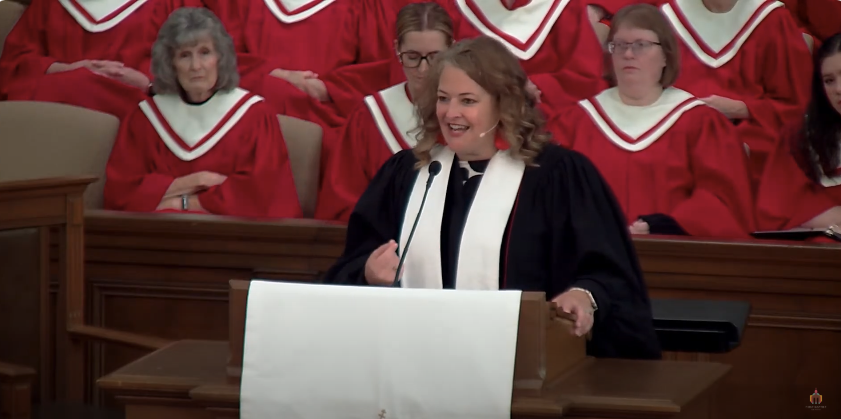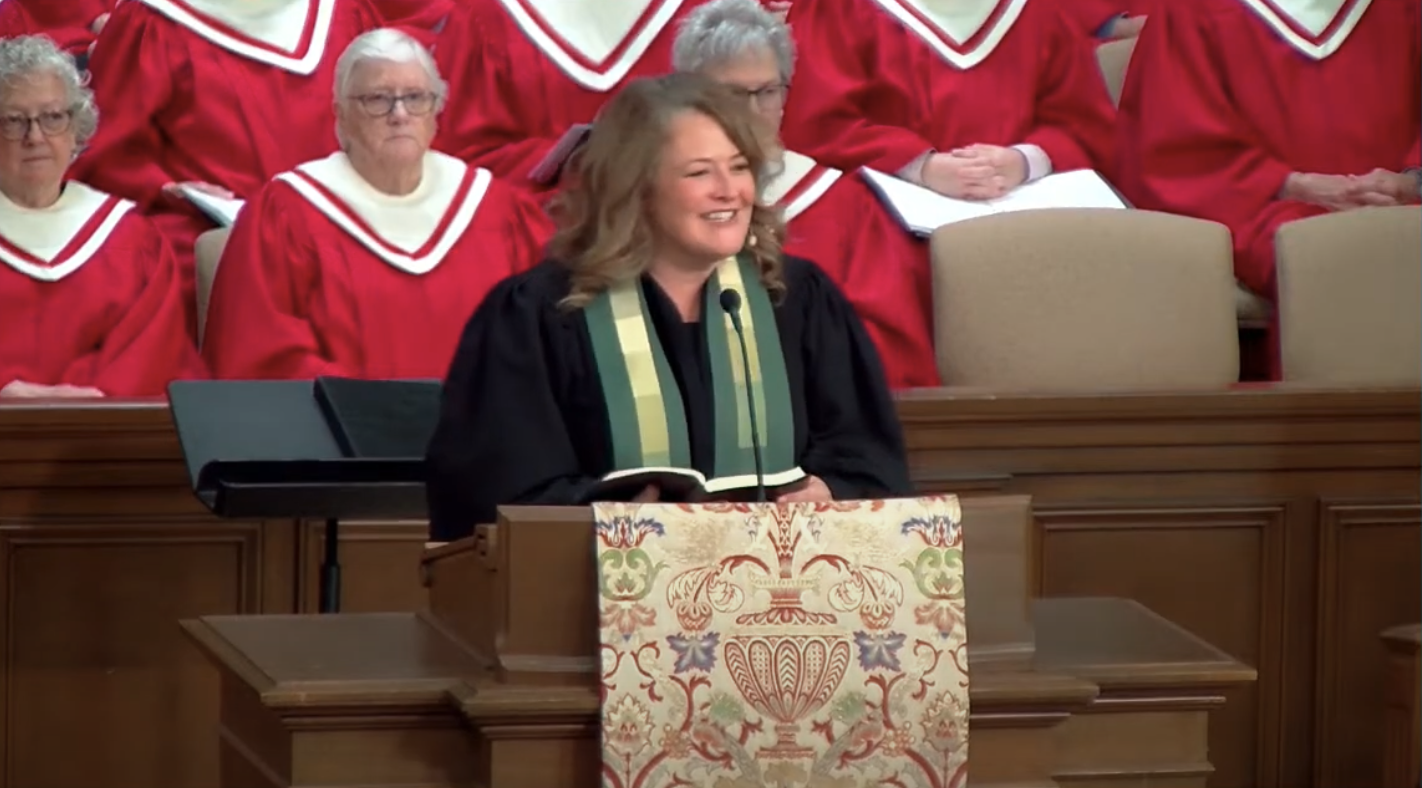I.As our friend Bill Leonard tells it, “Baptists began in a bakery, perhaps that’s why most of us particularly the Southern variety still can’t pass one without stopping.” It was 1609 when the first English Separatists gathered to organize the first Baptist congregation at the East India Bakehouse in Amsterdam. That little band of dissenters had come over from England to escape persecution, under the direction of their leader, John Smythe, and his friend, Thomas Helwys. Several years later, they’d journey to the new world with not much to their name save for their belief in a land where the church and state wouldn’t interfere with each other, that believers in Jesus would choose their faith for their very own.
Among all that these two pioneers gave us was this brief anecdote about baptism. They were wildly opposed to infant baptism, of course, but they weren’t quite sure about what to do in its stead. Hear their recorded words about the first time they practiced baptism together:
“Pastor and deacons laid down their office, the church disbanded or avowed itself no church, and all stood as private individuals, unbaptized. All being equal, Smyth proposed that Helwys their social leader should baptize them, but he deferred to his spiritual leader.”2 That’s what history tells us about their first baptism. In this critical moment that represented a living out of a core belief, these first Baptists improvised. They expanded. They opened wider the door. And thus, from bakery to baptism, the Baptists were born.
II.Over these four weeks, we’ll be talking about Baptists, but we’ll do so spending our time with Paul. Paul, the apostle, whose call from God and conversion as a follower of Jesus transformed his life and quite literally shaped human history. In Galatians as with much of the New Testament, Paul wrote letters to the early Christian churches who were struggling together to discern how to be the church after Jesus was no longer there to give answers.
And here’s where it gets interesting. You see, Paul had been a missionary to the people of Galatia. But he wasn’t the only missionary who came to the region. Others had arrived, and insisted that in order to be fully right with God, believers in Jesus had to follow Jewish law too. Paul calls them the “Judiazers,” trying to make any Christian conform to Jewish law first. And as a perfect example of the importance of biblical context, here, they’re talking about the practice of circumcision. The whole point of this letter that we now call Galatians is Paul writing to the Christians there to help them answer the question for all people, that is, “does a Jewish God who gives the Jewish law, who sent a Jewish Jesus as the Jewish messiah to the Jewish people in fulfillment of Jewish scripture require circumcision by non-Jews to receive the full benefits of salvation?”3
And in the spirit of dissent and passion, Paul gets rather hot in his letter. Absolutely not, he says assertively, in so many words. That would be a complete misunderstanding of the gospel which said that Gentiles, or non-Jews, are welcomed and included as Gentiles into the community of the people of God.4 All throughout Galatians, we’ll hear that Paul isn’t critiquing Jewish law or practice. Rather, he is speaking this expansive identity of the Christian family, reminding us that we don’t all have to conform to follow Jesus (thanks be to God!), that there are practices from certain streams of our heritage that can be reinterpreted in light of the good news.
And in today’s passage, we hear Paul’s take on that question of faith vs. works, meaning, what saves you? Is it what you believe, or what you do? Does praying the prayer and confessing belief in Jesus open the door to eternal life for you, if then you turn around and live a life filled with hateful actions? And who judges, or justifies that? “And we have come to believe in Christ Jesus,” Paul writes, “so that we might be justified by faith in Christ, and not by doing the works of the law, because no one will be justified by the works of the law.” Paul is suggesting that faith in Christ matters for salvation. So what does faith in Jesus Christ mean?
III.I want us to hold this question here, and enter into it from a particular lens. We’re talking these weeks, of course, about what it means to be Baptist. Some of you have lived your entire life as a Baptist and think being Baptist is just the most normal way to be a Christian. Others of you have come to the Baptist tradition in your life, and you’ve chosen it for its particularities. Even others of you are here because you love our church in spite of our Baptistness. (I won’t ask for a show of hands of closet Episcopalians in the room!) And I’m the one who confessed to you my act of rebellion as a Baptist pastors’ kid was announcing in seminary that I might just go and become a Methodist! Yet there is something distinct about this tradition from which we come, something that forms us as individuals and a community seeking to follow Jesus in our faith and in our works.
Over these four weeks, we’ll hear language about what it means to be Baptist, and so to put us on the same page, let me offer you one simple, straightforward way to define Baptist identity that generations of Baptists have learned called the four fragile freedoms.5 Baptist historian Buddy Shurden coined the term, noting how these freedoms are fragile, like any freedom for that matter, because they must be taught and lived and practiced, generation after generation. Our Baptist ancestors lived and even died for these freedoms. And they are: Bible freedom, soul freedom, church freedom, and religious freedom.
Bible freedom, that each of us has the right and responsibility to study, interpret, and apply the Bible as we feel led by God to do. We may choose to seek out greater biblical understanding together, but not me – not any of our brilliant Sunday School teachers or pastors or guides – will ever say to you, “this is exactly how you need to interpret scripture, and no other way.” Which is why, when one of you asked me this week, “what does First Baptist on Fifth believe about the Bible?,” I said cheerfully, “you’ll have to ask each member!” I’m sure we could easily find commonality and agreement and consensus around how we engage scripture, but part of our Baptist commitment is the freedom to do it ourselves.
Soul freedom, that each of us has the right and responsibility to engage with God without creed, government, or clergy interference. When Baptists began as a movement of Christians, they did so fleeing governmental interference with faith. When one was born as a citizen of England, the Church of England baptized babies upon birth, marking them with an inescapable religious identity. And it was the Baptists who said no! One’s decision to follow Jesus is the most important one they’ll make in a lifetime, and it isn’t mine or yours unless it is uncoerced. As Richard Groves says, “we must love God freely or not at all. God is not One who coerces.”6 This is why we practice believer’s baptism, where each person says with their own lips, “Jesus Christ is Lord,” meaning, in the words of my feisty seminary professor, James Dunn, “ain’t nobody gonna tell me what to believe but Jesus.”
Church freedom, that our local church – and every local Baptist church – has the right and responsibility to shape our understanding of living out the call of the gospel (membership, leadership, doctrine, practice) without interference from other churches. This might be the most confusing of the freedoms for non-Baptists, who assume sensibly that the First Baptist Church here and the First Baptist Church there are going to be pretty similar. Justified in their confusion, they wonder, among other things, how a church like ours could have a woman serving as senior pastor, and a congregation who is welcoming, affirming, and celebrating of all people, and be in the South but not Southern Baptist… and how another Baptist church just, um, isn’t. That’s church freedom.
Religious freedom, that we understand the separation of church and state to nurture the freedom of religion, the freedom for religion, and the freedom from religion for all people. From the very first days of our country’s founding, Baptists were the ones insisting on religious freedom to be encoded in our country’s commitments. It was Roger Williams, founder of the first Baptist church in America and the founder of Rhode Island as a “shelter for persons distressed of conscience,” who first talked about the “wall of separation between church and state,” believing both to be stronger and more vibrant when they don’t interfere with the other. Baptist pastor George Mason said it well when he said, “we believe in a free church in a free state. We believe in the separation of church and state – not the separation of God and government; not the separation of religion and public life; not the separation of the spiritual from the secular…. The persuaded church is also the persuasive church: we make our case in the public square like everyone else.”7
Just like with any freedom, these can be used for good or for ill. Any cursory read of Baptist history finds the past and present littered with indefensible defenses: of slavery, of abuses of power, of exclusion and hatred, of fear-mongering. For every Baptist you’ll find championing the particularities of Baptist beliefs, you’ll find another sharing works that seem so far removed.
Yet the language we use when we talk about how our beliefs are formed and expressed and shared really does form us. Because from the earliest days of Baptist expression, we’ve tried to put language around our faith that describes rather than prescribes. Our 17th century forebears wrote about the liberty of conscience in Baptist Confessions of Faith. And it was Harold Tribble, former president of our Wake Forest University, who in 1935 took the groundwork laid by Baptist leader E. Y. Mullins and crafted a book called The Baptist Faith.
This is why in most Baptist churches, you won’t hear the historic creeds of the faith, like the Apostle’s Creed or the Nicene Creed. We may all believe them, but it’s fundamentally anti-Baptist to suggest that any set of beliefs must be followed. Instead Baptists have used language of “confessions” of faith. Given the context of the Southern Baptist Convention today, it might be hard to imagine that Southern Baptists wrote these words proudly in the 1963 Baptist Faith and Message, where they said this: “confessions of faith constitute a consensus of opinion of some Baptist body, large or small, for the general instruction and guidance of our own people and others concerning those articles of the Christian faith which are most surely held among us… confessions are only guides in interpretation [of scripture], having no authority over conscience… They are statements of religious convictions, drawn from scriptures, and are not to be used to hamper freedom of thought or investigation in other realms of life.”8 If ever you wondered how we named our church’s 2021 “Confession of Identity,” that’s how.
Indeed as Baptists, we are free to believe. And that freedom gives us the right and responsibility to believe. Indeed, as Paul wrote to the church at Galatia and as Christians of all kinds have lived ever since, one’s identity as a follower of Jesus is drawn directly from one’s beliefs, not just from one’s identity or practices or works, however good and meaningful and true. Beliefs form opinions and motivate actions. Beliefs knit people together and tear them apart. Beliefs create worlds and worldviews, beliefs start wars and wind their way to reconciliation. There is power, great power, in belief. Indeed, Baptist beliefs at their best open the widest possible door to meet God in Jesus, persuading and compelling because of how good this news really is.
IV.Freedom of belief is fresh on my mind this morning after yesterday’s Pride parade and festival. We’ve had a presence at Pride for several years now, and have found it to be a most meaningful way to live out our call to a wide open Baptist faith through this work of Love.
I was standing at the booth yesterday afternoon, trying not to sweat on other people while handing out fans and stickers that tell the story of each person as God’s beloved child… when I saw a familiar face start to head my way. We’ll call him Jason. As I saw Jason and two friends of his walk right up to me, I presumed they were coming for fans in the 90-degree heat. (We had really good fans.) Yet it only took one glance at their hands, full of Bibles and tracts, to assume immediately where this conversation was headed. They were from a local Bible church, a whole group of men, walking up and down Trade Street with the intent, in their words, “to prompt repentance and conversion away from the ways of sin.” “Hey, I remember you!,” Jason said to me. I remembered him too. He’d approached me last year, with the same handful of Bibles and tracts and limited imagination for the breadth and depth and height of God’s boundless love.
Well that’s what I thought, at least. I felt the emotions from last June rise up within me again, and remembered how I, shakily from heat of the day and heat of my passion, came to the rousing defense of my beliefs and our confession of them together. Jason said, “yeah, I remember you! I remember how you told us we needed to listen to the stories of the people we’re trying to convert before we try and convert them.” Novel idea. Jason meandered off to find someone else, but his friend remained, clearly geared up to go tit for tat with a “lady pastor” about the Bible.
I could feel that familiar twinge fire up in me – I feel it even now! But just as quickly, that fire and the anger it represented cooled into compassion. This conversation partner of mine was locked and loaded, ready to defend certain lines of scripture I suppose for fear of what belief looks like in the nuance. I felt for him, and for all, anywhere, whose faith demands apology and defense, whose beliefs need a sparring partner to come to life, whose scripture compresses any freedom of interpretation into the party line. I told him from the very start: “I’m happy to talk with you, but not if you’re just trying to argue and change my mind. I doubt you will, and I doubt I’ll change yours.” Our conversation was cordial, if a little steely. Time and time again, he spoke from his beliefs about Leviticus and Romans 1 and abominations, I kept speaking from mine, of God’s expansive, transforming love, of the humble gift our church has to practice Kingdom of God-shaped belonging, of our inherent belovedness from the very start.
We didn’t change each others’ minds. And I confess, the moment he walked away, I threw his little tract in the trash. But just as he has the freedom to practice his faith, so do I. Just as he has the freedom to read his Bible and interpret it, so do I. Just as he has the freedom to align with a church and proclaim in the public square, so do I. So do we.
So do we share good news of a good God! So do we live out our beliefs together, confessing them as shapers of our identity and practice and community! So do we proclaim that because we have been transformed by God’s love in Jesus, it is no longer I who live – no longer we who live – but it is Christ who lives in me – in us! So do we exercise our freedoms of faith, building up their muscles with resilience. Commitment. Improvisation. Expansion. Imagination.
For it is for freedom that Christ has set us free. Amen!


